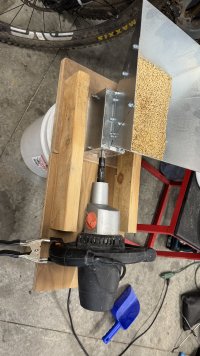- Joined
- Jan 17, 2014
- Messages
- 571
- Reaction score
- 175
Hi,
I use a cordless drill on my grain mill. I love it but have recently inherited a corded drill. Was thinking about using the corded in a more permanent build (with a wood base). The corded drill, though, is probably very old. There are no settings to adjust. It's one speed when pulling the trigger - FAST. Throttling the trigger does not spin the drill any slower, like what I can do with the cordless.
So what? So, from what I recall, the recommendation was to not run the drill at full speed when milling. If that's the case, project canceled. Thanks in advance!
I use a cordless drill on my grain mill. I love it but have recently inherited a corded drill. Was thinking about using the corded in a more permanent build (with a wood base). The corded drill, though, is probably very old. There are no settings to adjust. It's one speed when pulling the trigger - FAST. Throttling the trigger does not spin the drill any slower, like what I can do with the cordless.
So what? So, from what I recall, the recommendation was to not run the drill at full speed when milling. If that's the case, project canceled. Thanks in advance!






























![Craft A Brew - Safale S-04 Dry Yeast - Fermentis - English Ale Dry Yeast - For English and American Ales and Hard Apple Ciders - Ingredients for Home Brewing - Beer Making Supplies - [1 Pack]](https://m.media-amazon.com/images/I/41fVGNh6JfL._SL500_.jpg)



























